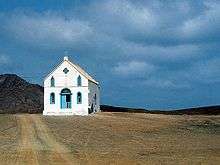Pedra de Lume
| Pedra de Lume | |
|---|---|
 | |
 | |
| Coordinates: 16°45′47″N 22°53′42″W / 16.763°N 22.895°WCoordinates: 16°45′47″N 22°53′42″W / 16.763°N 22.895°W | |
| Country | Cape Verde |
| Island | Sal |
| Municipality | Sal |
| Civil parish | Nossa Senhora das Dores |
| Population (2010)[1] | |
| • Total | 329 |
 Pedra de Lume chapel and lighthouse | |
 Cape Verde | |
| Location |
Pedra de Lume Sal Cape Verde |
|---|---|
| Coordinates | 16°45′50.1″N 22°53′34.2″W / 16.763917°N 22.892833°W |
| Year first constructed | 1855[2] |
| Foundation | masonry base |
| Construction | masonry building |
| Markings / pattern | white building |
| Height | 7.9 metres (26 ft) |
| Focal height | 13 metres (43 ft) |
| Range | 1 nautical mile (1.9 km; 1.2 mi)[3] |
| Characteristic | F R (occasional) |
| Admiralty number | D2923.1 |
| NGA number | NGA 24180 |
| Managing agent | private[4] |
Pedra de Lume (also Pedra do Lume,[5] Cape Verde Creole: Pedra di Lumi) is a village in the northeastern part of the island of Sal, Cape Verde. The village is situated on the east coast, about 5 km east of the island capital Espargos. Pedra de Lume has been famous for its salterns[5] which began around the 18th century. Together with Cagarral, the saltworks and around the mountain forms Cape Verde's protected area[6]
The Pedra de Lume crater is around 900 m in radius and is an extinct volcano. The area features salt evaporation ponds built over a natural salt lake that formed through infiltration of water from the sea, since the base of the crater is below the sea level, thus forming the lowest point in Cape Verde. The salt extraction is currently inactive since the 1990s.
Baía da Parda lies to the south. Other landmarks includes a chapel and Farol de Pedra de Lume located 1 km northeast.

History
Cape Verde's first salt mine was created in 1799. Cape Verde's first tunnel would be constructed in 1804, and it was the only tunnel in Cape Verde until 2008 when the Pombas and Ponta do Tumba tunnels on Estrada de Corda in eastern Santo Antão would be constructed. Pedra de Lume was the island's first settlement, founded in around 1800; it was the last major island of Cape Verde to become inhabited. Salt production was very active in most of the 19th century, with most of it being exported to Brazil until Cape Verde's nationalization in 1887. Most salt produced there in the 20th century was exported to France (company: Les Salines du Cap-Vert which was part of Salins du Midi) Salt would be carried on suspended cableways. Exports rose in the 1930s, but its production later fell and ceased continuation in 1999. Fishing later became its chief industry, and tourism is now soaring. Pedra de Lume saltworks was listed to become a UNESCO World Heritage Site in 2004, but never became one and it remains in the tentative list.[7]
In 2010, construction began on a hotel and a touristic complex, its plans were made in the mid-2000s together with a golf course, the first in Cape Verde.[8]
Sports
The only football (soccer) club in Pedra de Lume is SC Verdun which plays in the Sal Regional Premier Division.
Notable people
- Ildo Lobo, singer
- Mirri Lobo (Emilio de Sousa Lobo), singer
See also
References
- ↑ "2010 Census results". Instituto Nacional de Estatística Cabo Verde (in Portuguese). 17 March 2014.
- ↑ Chapel image with construction date
- ↑ List of Lights, Pub. 113: The West Coasts of Europe and Africa, the Mediterranean Sea, Black Sea and Azovskoye More (Sea of Azov) (PDF). List of Lights. United States National Geospatial-Intelligence Agency. 2015.
- ↑ "Cape Verde". The Lighthouse Directory. University of North Carolina at Chapel Hill. Retrieved 15 April 2017.
- 1 2 José Joaquim Lopes de Lima, Francisco Maria Bordalo (1844). Ensaios sobre a statistica das possessões portuguezas na Africa occidental e oriental; na Asia occidental; na China, e na Oceania: escriptos de Ordem do Governo de sua Magestade Fidelissima a Senhora D. Maria II por José Joaquim Lopes de Lima ... Imprensa Nacional. p. 182.
- ↑ "Protected Areas in Cape Verde" (in Portuguese).
- ↑ "Pedra de Luma Saltworks in Cape Verde's Tentative List" (in French).
- ↑ "Pedra de Luma" (in Portuguese). 11 February 2010.
Further reading
- André Barbe, Pierre de Feu (Pedra de Lume) – Île de Sal et les Salins du Midi (1920-1999), Les îles du Cap-Vert, de la découverte à nos jours, une introduction : de l'entrepôt des esclaves à la nation créole, L'Harmattan, Paris, 2003, p. 220-221 ISBN 2-7475-3730-7
- Auguste Chevalier, Léonce Joleaud et Georges Petit, Les Dépôts quaternaires de l'ancien cratère de Pedra de Lume (île de Sal, archipel du Cap-Vert) (Quaternary Depots of the Old Crater of Pedra de Lume), extract of Comptes-rendus des séances de l'Académie des sciences, vol. 200, 1935, p. 1334-1336 (8 April 1935), Gauthier-Villars, Paris, p. 3
- S. Master, The salina of Pedra da Lume, Ilha do Sal, Cape Verde Islands (and a comparison with the Pretoria saltpan), in Geobulletin, 1993, vol. 36, no. 3-4, p. 31-33
- L.C. Silva, A. Serralheiro, P.C. Torres and M.H. Mendes, Phreatic/phreatomagmatic structures in the Cape Verde Islands: the Salina de Pedra Lume (Sal Island) example, in Journal African Earth Sciences 30 (4A), 81, 2000
External links
| Wikimedia Commons has media related to Pedra de Lume. |
- Pedra Lume é berço da História da ilha do Sal - RTC, March 24, 2012 (in Portuguese)
- Pedra Lume as a National and a Cultural Landmark of Cape Verde - RTC, March 24, 2012 (in Portuguese)
- video showing saline lake on YouTube
